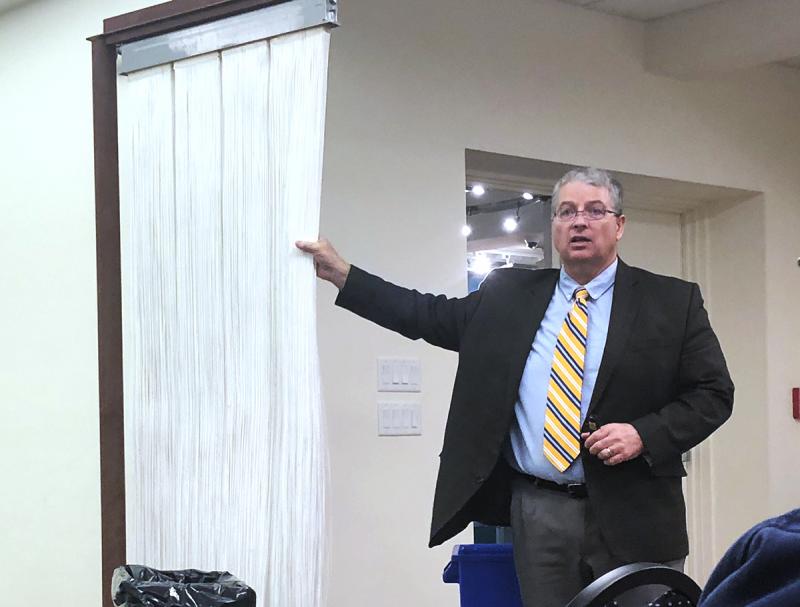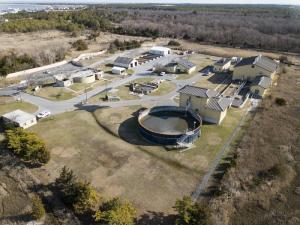Lewes BPW outlines wastewater plant failures
Officials say a series of events likely led to the discharge of nearly 4 million gallons of partially treated wastewater in the Lewes marsh.
The Lewes Board of Public Works gave a status update Jan. 29 on its investigation into the release that occurred from Dec. 19 to Jan. 1 at the Howard Seymour Water Reclamation Plant on American Legion Road.
Following the presentation, new information about a tear in a filter, a change to settings for a critical meter and maintenance of the plant’s filters was brought to light by members of city council, who toured the wastewater plant since the incident.
Councilman Rob Morgan learned a tear in one of the plant’s micron filters allowed untreated wastewater through the filters and into a discharge tank, which is typically full of clean water. Periodically, water from that tank is used to backwash and clean the filters, and instead of clean water, the process occurred with dirty water, clogging the filters.
During Deputy Mayor Fred Beaufait’s tour, he said, he was told workers in the filter building changed the settings on the turbidity meter, which monitors water quality after its run through the filters. Beaufait said the settings were changed so an alarm would sound less frequently.
BPW President Preston Lee said the BPW was waiting to receive plant operator White Marsh Environmental Systems’ final report before releasing any information on that issue.
“This is exactly what we don’t want to get into yet because we don’t have the data yet,” he said.
Beaufait urged BPW officials to look into the issue.
“This is very critical in how you managed the failure,” he said. “My question is why was somebody changing the turbidity meters to higher ratings? Did they have the authority to do so? It’s been nearly a month, and I don’t understand why you don’t have this basic data.”
BPW member Tom Panetta scoffed at the intimation that the BPW is withholding information or moving too slow.
“The last month we’ve been concentrating with White Marsh on getting the plant back up online, getting new filters ordered and understanding the initial event,” he said. “The time hasn’t necessarily been available to us to take a breath and do the analysis. I understand the sense of urgency, but we will get this done and we will make a final presentation.”
He said the final report will evaluate equipment failure, personnel, communication and procedures.
“To say that one specific issue was the cause of the failure at this point is inappropriate,” he said.
Reading from the manufacturer’s report, Mayor Ted Becker said an accumulation of debris and solids on the filters indicated a lack of preventative maintenance and cleaning. That, the report says, puts the system in a condition where it operates at minimal performance.
The filters were installed as part of a $12.5 million upgrade to the plant in 2007.
In 2017, former plant operator Severn Trent said the filters were reaching the end of their life and BPW should consider replacement. BPW officials said White Marsh indicated the filters were still fine.
“There is nothing in [White Marsh’s] reports that has said the membranes are about to fail or they’re old, and it’s about to fail,” said BPW General Manager Darrin Gordon. “In fact, I have had conversations with them that said they’re doing great and they’ll last another year.”
The BPW has had replacements included in its five-year capital budget, but Gordon said they’ve continued to push back the purchase because of recommendations from White Marsh.
“I trust them as the operator,” Gordon said. “They’re the professionals.”
In its report, the manufacturer Suez determined the filters had not reached the end of their life when the accident occurred, Lee said.
And while the plant is operating well within its 1.4 million gallons per day capacity, Councilwoman Bonnie Osler pointed to another part of the manufacturer’s report that found the plant may be working harder than what it was designed for, possibly adding stress to the filters.
Panetta cautioned council not to release information that hasn’t fully been investigated, because they have yet to identify the root cause of the problem. He compared their investigation to that of an investigation into a plane crash by the National Transportation Safety Board.
“They release a portion of information up front to keep the public informed, and then they collect all the data and put out a final report,” he said. “They do not release dribs and drabs, because the things you find may redirect what the actual problem is.”
The BPW’s presentation Jan. 29 included a day-by-day recap of the incident and a summary of a report by filter manufacturer Suez, and a partial report from plant operator White Marsh. Lee said White Marsh officials indicated a final report will be submitted within a few weeks.
Now that the plant is again operational, Lee said the primary goal is to determine what caused the failure. Beyond that, he said, the BPW will institute steps to prevent another failure.
One immediate action the BPW took was to replace turbidity meters on all four filter channels. They also added a new turbidity meter with an alarm on the tank that holds treated wastewater used for backwashing.
Gordon said the BPW is investigating whether it’s viable to build a second tank for redundancy, so that if one tank is contaminated with unclean water, the other can take over.
They’re also looking into adding a new filter earlier in the treatment process, to reduce the amount of solids reaching the facility’s four main micron filters.
“That is a beautiful plant we have. It has done such a great job of protecting the environment and the canal over the years,” Lee said. “Hopefully all the good work this plant has done will not go to waste with of this one incident.”
As part of the aftermath, the BPW will develop a plan in case of a future plant failure.
Timeline of events
At 3 a.m., Dec. 19, a White Marsh employee received a call about a high-level alarm at the plant. A half hour later, White Marsh was on site and discovered the system had backwashed dirty water into micron filters for 90 minutes, forcing contaminants into the filter’s membranes.
At 6 a.m., Sussex County was asked to stop sending effluent to the BPW’s plant. Gordon was notified about 8:30 a.m.
“We were told the plant had issues, and they were confident they could get it back online quickly,” said Gordon, who was on his way to Utah when he received the call.
After contacting Suez for technical support, White Marsh attempted to clean the filter membranes with a sodium hypochlorite soak and a citric acid soak. Neither was successful.
By 3:15 p.m., the plant’s 400,000-gallon holding tank was full and a 150,000-gallon backup tank was nearly at capacity. Foreseeing the problem would not be fixed in time, White Marsh then notified DNREC that the system would be bypassed, and they would begin discharging effluent disinfected by hydrogen peroxide into the marsh.
DNREC collected water samples at the Freeman Bridge, the plant’s outfall, at the Savannah Road drawbridge and at Roosevelt Inlet.
During the 10-day bypass incident, 781 pounds of nitrogen and 98 pounds of phosphorus were discharged into the marsh. BPW’s original estimate was that nearly 5 million gallons of partially treated wastewater was discharged, but more analysis determined the actual figure was just under 4 million gallons.
Anticipating potential problems, DRNEC closed shellfish harvest areas in the lower Delaware Bay for 21 days.
Efforts to clean the plant’s filters continued until Dec. 21, when a White Marsh employee slipped on a loose grate and fell into an empty channel where the filters are housed. It was originally thought to be a minor injury, but officials say the employee suffered a broken back and required surgery. Per Occupational Safety and Health Administration standards, the area was cordoned off, and an investigation and safety assessment began.
On Dec. 22, BPW ordered a new set of filters to replace the clogged filters. White Marsh employees then began manually cleaning the existing filters.
On Dec. 23, four days after the incident began, Lee and Becker were notified of the problem. Becker said he found out from DNREC Secretary Shawn Garvin.
“I did not do a good job of communicating with Pres and the mayor,” Gordon said.
New filters arrived from Canada Dec. 27, and by Dec. 28, the new set was installed and the system bypass ended.
On Dec. 31, a set of manually cleaned filters was reinstalled, but when White Marsh attempted to bring that set back online Jan. 1, they failed, due to overpressure. Later Jan. 1, a high-pressure alarm went off for the new set of filters, forcing crews to again bypass the system and discharge partially treated waste. After talking with the manufacturer, crews were able to adjust the system and get it was back online two hours later.
A second set of new filters arrived Jan. 7. They went online Jan. 9. Gordon said replacements for the final two older sets of filters are being ordered this week.
Nick Roth is the news editor. He has been with the Cape Gazette since 2012, previously covering town beats in Milton and Lewes. In addition to serving on the editorial board and handling page layout, Nick is responsible for the weekly Delaware History in Photographs feature and enjoys writing stories about the Cape Region’s history. Prior to the Cape Gazette, Nick worked for the Delmarva Media Group, including the Delaware Wave, Delaware Coast Press and Salisbury Daily Times. He also contributed to The News Journal. Originally from Boyertown, Pa., Nick attended Shippensburg University in central Pennsylvania, graduating in 2007 with a bachelor’s degree in journalism. He’s won several MDDC awards during his career for both writing and photography. In his free time, he enjoys golfing, going to the beach with his family and cheering for Philadelphia sports teams.























































